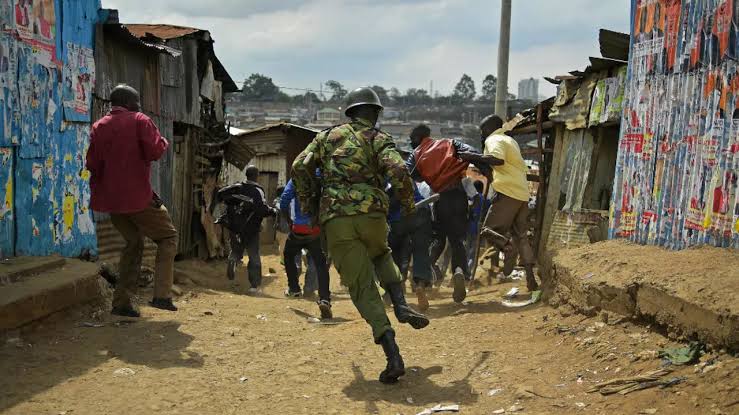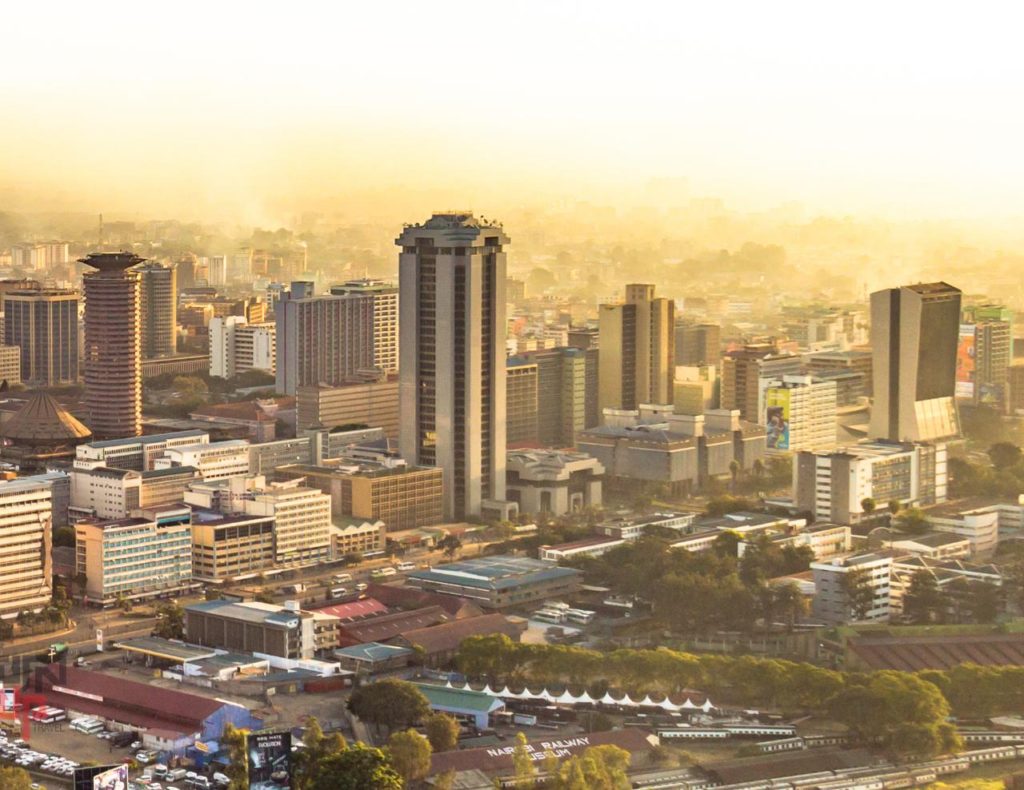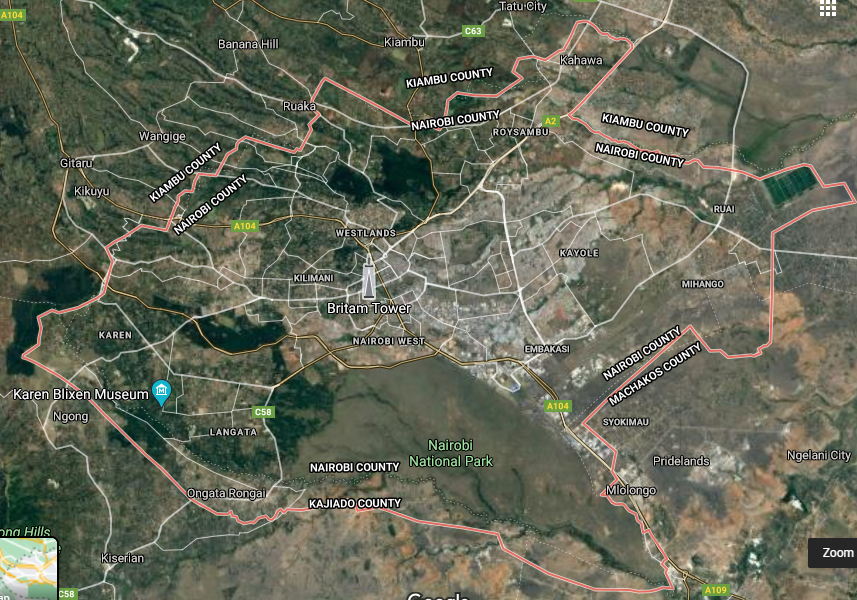Scenic view of Nairobi CBD.Photo/Courtesy
NAIROBI, Kenya, Apr 14- As Kenya nears the 2022 general elections, security agencies have started mapping out hotspot areas, and more so within Nairobi City- which serves a regional hub and seat of power for the country.
President Uhuru Kenyatta is serving his second and final term, and his succession has already attracted tens of leaders seeking the country’s top seat, in what is emerging as one of the hotly contested succession politics.
It is on this footing that Kenya’s security players have started planning in earnest, identifying areas likely to be exploited and more so by politicians and criminal gangs, some hired for political purposes.
Nairobi, for example, has been zoned in 3 areas, according to details of a security strategy plan seen by Shahidi News.
“We are planning ahead of time just to ensure the country is safe before and after the elections,” a senior officer involved in planning, but sought anonymity said. A multi-agency team is involved in planning.
Majority of the country’s population, the youth, poses the greatest challenge, security players say, due to the vulnerability of being misused by politicians- who exploit their lack of employment.
Already, some of the criminal gangs that have been inactive since 2017 have started re-emerging while others are becoming more active.
Nairobi is mapped out in 8 ‘red zones’, where most of the criminal gangs operate from. Most of the said areas are often marred with post-election violence despite their cosmopolitan nature.
The areas include Kahawa West, Riruta Satellite Area extending all the way to Kawangware residential area, Kibera, Nairobi Central Business District, Kamukunji area including Eastleigh, Makadara, Soweto, Kayole and Embakasi North.
Notably, some of the profiled areas are residence to the city’s poorest, who are also victims of police brutality according to reports by various human rights organizations like the Independent Medico-Legal Unit.

According to various lobby groups, most victims of police excesses are urban youths living in informal settlements.
Some of the identified criminal gangs operating in the profiled areas are J10, Al Safa, Kibera Battalion, Siafu, Nubians, Taliban, Kamukunji Pressure Group, Super power, Gaza, Usiku Sako, Kamjesh, Congo boys and Kenya Youth Alliance.
According to security agencies, they are engaged in extortion, political hire, informal water and electricity connection, garbage collection and theft among other crimes.
-Gangs for hire and their role-
In Nairobi Central Business District, which is the heart of Kenya’s capital city, three criminal gangs have been identified to have pitched camp there and terrorizing city residents.
They are; Yes we can, Kenya Youth Alliance and Kamjesh; they are said to be engaging in “extortion, informal security services, political hire.”
Kamjesh is specifically engaged in extorting money from the matatu operators.
The Yes We Can gang is also engaged in providing informal security services, informal water and electricity connection, political hire and extortion in Kibera.
Taliban gang engages in matatu extortion, political hire and providing informal security services in Kibera.
Another gang operating within Kibera slums is Kamukunji Pressure Group which engages in similar activities as Yes We can gang, Siafu, J10 and Kibera Battalion.
In Eastleigh, the criminal gang identified to be operating there is dubbed Super power.
Members of the super power, security agencies said, engages in “gun trafficking and organized armed heists, theft and burglary.”
Gaza gang is found in Kayole and Soweto areas, where they accused of behind most of crimes and gun violence.
They also engage in informal electricity connection.
Other gangs operating in Kayole are Siafu, Usiku Sacco and Kamjesh engaging in among other things matatu extortion.
In Embakasi North, gangs that were found are Siafu, Taliban and Kamjesh, and all engaged in matatu extortion, political hire and offering informal security services.
Kamjesh other operating areas is Kahawa west residential area, where they engage in matatu extortion. Also found in Kahawa West is the Super Power criminal gang, which engages in gun trafficking and organized armed heists.
Kamjesh are also the main criminal gang in Makadara area, where they mainly engage in matatu extortion.
Congo Boys are found in Kawangware and Riruta satellite settlement area. Also found in the two areas include Siafu, where they engage in street robbery and burglary among other crimes.
A 2012 report by the National Crime Research Centre indicated that there has been a sharp increase in the number of organized crimes in the country in recent years.
These outlawed criminal groups operate in diverse regions in the entire country.
“There is no doubt at all that the criminal activities these groups are engaged in have deleterious consequences on our society. It causes fear and desperation in the lives of law-abiding citizens,” reads the report.
“The study profiled 46 organized criminal gangs that engaged in extortion, illegal levies, violence, hire for revenge, executions, illegal oathing, promoting hatred, burglary, drugs, theft, murder, human trafficking, trafficking of weapons, cattle rustling, murder, hire by businessmen/politicians for protection or intimidation of opponents, evictions, among others.”
It emerged that organized criminal gangs have infiltrated legitimate formal and informal business especially public transport, car wash, motorcycle, rental houses, exhibition shops and scrap metal.
Extortion from the public (34.3pc) and theft (19.4pc) and politicians were the main sources of funds for their operations.
Illicit drug trafficking, counterfeiting, armed robbery, vehicle theft, kidnap for ransom, extortion, livestock theft, firearms smuggling were identified as the other sources of funds for organized criminal gangs.
“It is an undisputed fact that organized crime poses a real challenge in the security of this country,” reads the report.
Want to send us a story? Contact Shahidi News Tel: +254115512797 (Mobile & WhatsApp)



